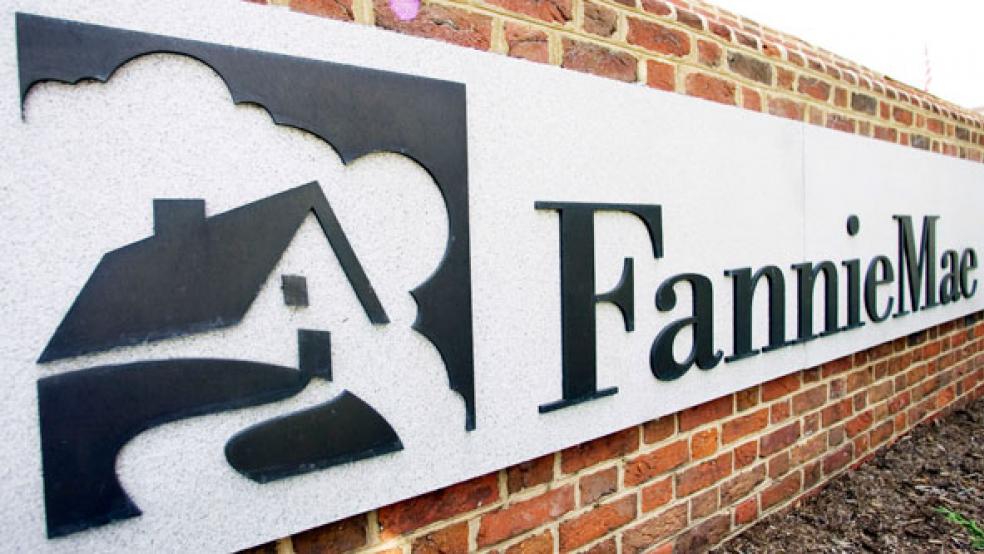It’s been five years since the housing crisis sunk the U.S. economy – long enough for Capitol Hill to finally start dueling over how to best fix the mortgage industry.
The battle has heated up this week, as shown by three major events:
* The Senate Banking Committee is slated to vote Thursday on President Obama’s pick to oversee Fannie Mae and Freddie Mac, the troubled mortgage giants on government life support since 2008. A party-line vote is expected to move forward the nomination of Rep. Mel Watt (D-NC) to oversee the Federal Housing Finance Agency.
* House Financial Services Committee Chairman Jeb Hensarling (R-TX) will hold a hearing Thursday to discuss his planned bill to bury Fannie and Freddie. The measure would end the government guarantee for mortgages – and as a likely consequence the 30-year fixed rate mortgage.
* At the Bipartisan Policy Center on Wednesday, Sens. Bob Corker (R-TN) and Mark Warner (D-VA) discussed their bill to preserve the government guarantee while also dissolving Fannie and Freddie.
What explains this newfound urgency after five long years?
After all, Congress chose to sidestep an overhaul of the mortgage system in the 2010 Dodd-Frank financial reforms. Instead, it maintained the current set-up in which the government effectively guarantees mortgages to lower borrowing costs for homebuyers.
This approach reduces the risk for lenders, enabling them to offer 30-year fixed rate mortgages. It also, through Fannie and Freddie – which packages mortgages into securities – created a perverse structure in which taxpayers were forced to shoulder the epic losses. These two companies under government conservatorship are guaranteeing 77 percent of mortgages.
As strange as it sounds, Corker said on Wednesday that the impetus is the recent bounce back in housing prices. Housing starts may have slowed – but Fannie and Freddie have returned to profitability.
Because home values are steadily climbing by double digits in some communities, the companies have been able so far to repay $131.6 billion of the $187.5 billion they received in taxpayer aid. The profits are large enough that a hedge fund, Perry Capital, filed a suit this month stemming from the government conservatorship.
This transformation from economic parasite to cash cow has political consequences. When Fannie and Freddie become profitable businesses, lawmakers know that any momentum to tear them down will fade. And if the current system is preserved, congressmen are also aware that the boom-bust-and-bailout cycle could be repeated.
“People understand that this is the one piece of unfinished business,” Corker said Wednesday at a panel discussion hosted by the Bipartisan Policy Center. “Most Republicans realize that the window is closing. In other words, if we don’t take action soon, it’s going to be difficult to take action.”
The Tennessee senator estimates that a five-month window of opportunity exists in the congressional calendar to reach an agreement.
But the tension between the House and Senate approaches, which could ultimately prevent any overhaul from occurring, is over what role the government should play.
The Hensarling bill would largely eliminate the government backstop, winding down Fannie and Freddie over five years, and largely entrusting the private market to reckless lenders before a bubble gets inflated.
This would presumably increase mortgage rates, but Hensarling said the virtue is that mortgage defaults should fall as buyers would only be able to qualify for smaller loans. “More people will have opportunities to buy homes that they can actually afford to keep,” Hensarling told The Dallas Morning News.
Virginia Sen. Warner – the Democrat who often appears to be the ringleader for the chamber’s many bipartisan gangs – dismissed the House measure Wednesday as an “ideologically pure exercise, which will never have a single Democrat ever support it.”
In other words, his bipartisan Senate approach is the only realistic game in town because Democrats will never tolerate handing over the entire mortgage industry to Wall Street.
Co-sponsored by seven other senators, the Corker and Warner bill would require the issuers of mortgage-backed securities to hold a 10-percent cash buffer in case prices drop, while paying to a new government agency what amounts to an insurance premium to minimize any losses for taxpayers.
The measure could get some competition within the chamber. Senate Majority Leader Harry Reid (D-NV) is reportedly considering a separate measure that would keep Fannie and Freddie intact.
As shown by immigration reform, a Senate measure – even one passed across party lines – is futile without an armada of champions in the House. Corker noted that the goal of their bill is not punitive, but to craft a balanced measure that can be signed into law and enforced by regulators.
The most important step will be the sales pitch by Corker and Warner, since skepticism abounds about any progress on this issue. Besides the divide with the House, there are investors and companies with a stake in maintaining the status quo.
“There are a lot of people around here banking on Congress not taking action,” Corker said. “We’re out to create a system that we think will stand the test of time.”




